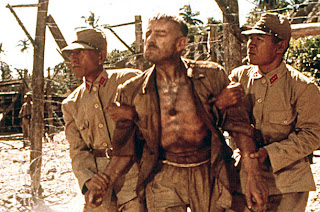It marked the last decade for Bogart, who did some of his best work, and for Gary Cooper. Marlon Brando was at the top of his game, and it was perhaps the best decade for Westerns. Two make my list, but it was a rich genre. Cooper won his second Oscar with High Noon; Anthony Mann and Jimmy Stewart produced five terrific collaborations, including Winchester '73 and The Naked Spur; and Budd Boetticher and Randolph Scott combined for several classics.
Hitchcock continued his impressive run and peaked commercially in the decade with several classic suspense films. I include just one, and omit Strangers on a Train, Rear Window and North by Northwest.
Other directorial achievements of note included came from Nicholas Ray, Billy Wilder, and the great John Ford, but other fine films of theirs are omitted.
Foreign directors continued to make wonderful films, even if some weren't shown in America. I include just two here and must omit several worthy ones. De Sica's Umberto D is the best film to ever feature a dog, and Fellini made two poignant films with his wife, Giulietta Masina: La Strada and Nights of Cabiria. Jules Dassin's Rififi is a tight noir that paved the way for heist films, and Henri-Georges Clouzot gave us the Hitchcockian Diabolique and Wages of Fear.
1. In a Lonely Place 1950
Humphrey Bogart's best performance in Director Nicholas Ray's best film. Is he a murderer or not? Gloria Grahame plays his confused lover, trying to help him overcome his inner demons. From the pulp novel by Dorothy Hughes, it contains a memorable last scene. "I was born when she kissed me. I died when she left me. I lived a few weeks while she loved me."
2. Sunset Boulevard 1951
Billy Wilder's scathing look at Hollywood follows the weird affair of a has-been movie star, Norma Desmond (Gloria Swanson), with struggling writer Joe Gillis (William Holden). Swanson gives one of film's iconic performances. "Mr. DeMille. I'm ready for my closeup."
3. Tokyo Story 1953
The third of Director Yasujiro Ozo's "Noriko Trilogy," packs an emotional wallop. Setsuko Hara is the generous daughter-in-law in a family whose children are too busy to bother with its aging parents. Now considered on the short list of greatest films ever made, it was not released in the United States until 1972.
4. Shane 1953
One of the most authentic Westerns, it is George Stevens' best film and Alan Ladd's signature role as a retired gunfighter who helps farmer Joe Starett (Van Heflin) fight off cattlemen in a range war. Shot against the beautiful Grand Tetons it is Jean Arthur's last film and includes one menacing bad guy in Jack Palance as Jack Wilson.
5 On the Waterfront 1954
Marlon Brando as dock worker Terry Malloy comes up against the brutal union led by Lee J. Cobb. Brando won a well-deserved Best Actor Oscar in that year's Best Film. The most memorable scene takes place inside a taxi between brothers Brando and Rod Steiger. "I coulda been a contender."
6. The Searchers 1956
John Ford and John Wayne's best collaboration and cinematographer Winton Hoch's masterpiece. Inexplicably neglected at that year's Oscars, it is now on the short list of greatest Westerns. Wayne is a brutally racist Ethan Edwards out to rescue his abducted niece. A great final shot of Wayne in the doorway.
7. Sweet Smell of Success 1957
Easily Tony Curtis' best performance. He is Sidney Falco, a sleazy sycophantic press agent. Burt Lancaster plays the powerful columnist J.J. Hunsecker. Filmed in glorious black and white, New York City never looked more grittier. Ernest Lehman co-wrote the memorable script. "Match me, Sidney."
8. The Bridge on the River Kwai 1957
Director David Lean's first epic, and maybe his best. Alex Guinness gives his signature Oscar-winning performance as a rigid British colonel who helps the Japanese build a bridge. His counterpart is Sessue Hayakara as the Japanese colonel, facing Hari Kari if the bridge isn't completed on time. William Holden leads the commando raid to stop them. With a rousing climax, it deservedly captured that year's Best Film.
9. Vertigo 1958
Alfred Hitchcock's most complex film. Jimmy Stewart is a retired detective afraid of heights and obsessed with a dead woman. The twist, revealed mid-stream, is stunning the first time you see it. A magnificent score by Bernard Hermann, impeccable editing by George Tomasi, and a memorable title sequence by Saul Bass make it one of the most satisfying film experiences.
10. The Cranes are Flying
One of the first Russian films produced after the death of Stalin that deviated from the state's imposed mandate to champion Russia as a military victor, the film tells the story of a beautiful young couple separated by the war. Tatyana Samojlova, as Veronika, promises to wait for Boris, who finds himself on the Eastern front. The film depicts war as ugly and devastating and won that year's Golden Palm at the Cannes Film festival.
Just Misses:
Early Summer 1951 with Setuko Hara.
Moby Dick 1956 with Gregory Peck.
Touch of Evil 1958 with Orson Welles.
Room at the Top 1959 with Simone Signoret and Lawrence Harvey.













Fabulous post! I would find it impossible to select just 10 from the 50s (or 60s - my key decades). I would have to include Kazan's EAST OF EDEN, Ray's JOHNNY GUITAR (the first film I saw aged 8 - what a vivid introduction to cinema!), Tashlin's THE GIRL CAN'T HELP IT and other delights like THE BANDWAGON. I agree about UMBERTO D, TOKYO STORY and all those Cukors, Minnellis, Hitchcocks, Wilders, Wylers, Hustons etc.
ReplyDelete